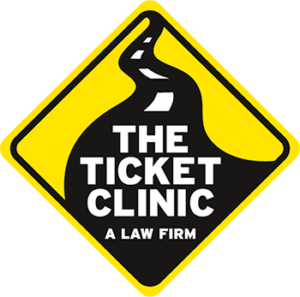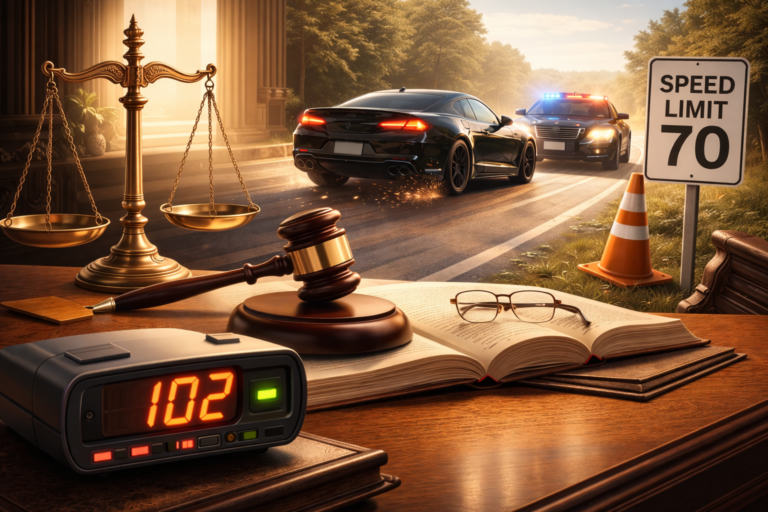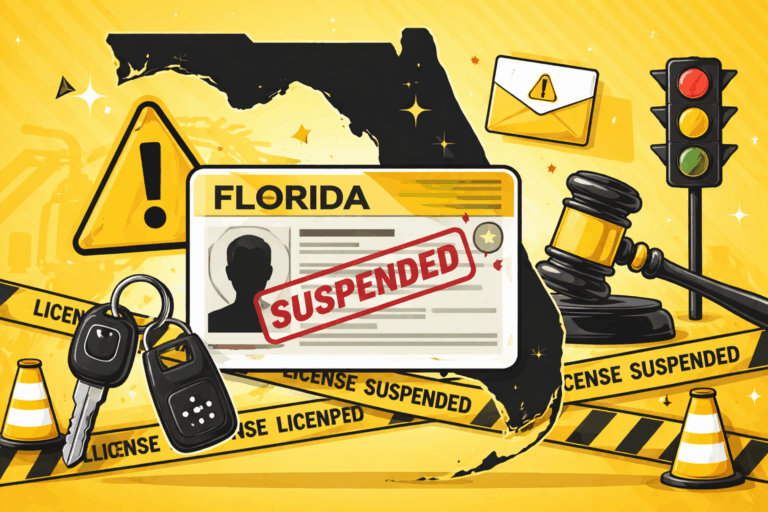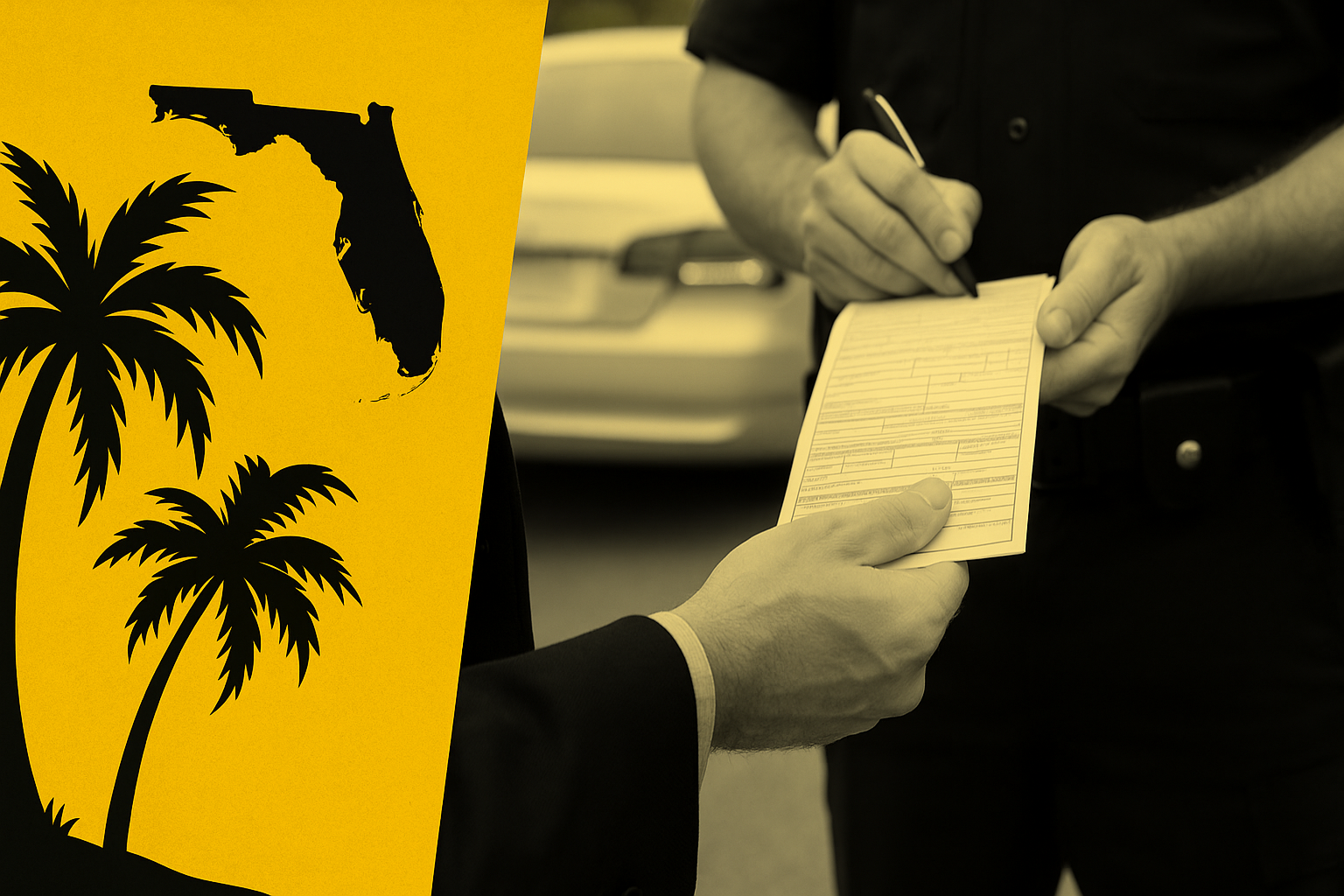When you get a speeding ticket in Florida, you should reconsider just “paying it”—doing so admits guilt and adds points to your record. Instead, you can choose from several smarter routes: contest the citation in court, plead guilty but complete traffic school to avoid points if you’re eligible, or hire a traffic lawyer to challenge technicalities like radar calibration or procedural missteps. It’s about recognizing your options—each carries different risks and benefits—and deciding whether to take the easy route, protect your driving record, or mount a full defense.
Q: What laws regulate speed on Florida public roadways?
- Fla. Stat. § 316.183(2): establishes default maximum speed limits—30 mph in business or residential districts, 55 mph elsewhere, with possible reductions in residential zones to 20 or 25 mph after investigation; sets minimum speeds on multi‑lane interstates.
- Fla. Stat. § 316.189: authorizes counties/municipalities to designate specific speed zones, requires proper signage. Violation of such limits is a moving violation under Chapter 318.
Speeding Offenses and Penalties
Ordinary Speeding (Civil Infractions)
- Chapter 318: covers non‑criminal civil traffic infractions including routine speeding tickets. Penalties depend on degree over the limit, typically fines and points assessed.
Reckless Driving
- Fla. Stat. § 316.192: reckless driving is criminal—driving in willful or wanton disregard for safety. First conviction: up to 90 days jail or $25‑$500 fine (or both). Second or subsequent: up to 6 months jail or $50‑$1,000 fine. If crash results in injury/damage, may be a first‑degree misdemeanor.
New “Dangerous Excessive Speeding” aka “Super Speeder” Law (Effective July 1, 2025)
House Bill 351 (codified in FL statutes):
- Defines “dangerous excessive speeding” as:
- Exceeding the limit by 50 mph or more, or
- Driving 100 mph or higher, regardless of limit.
- This becomes a criminal offense under new statutory provisions (added to statutes via CS 351/HB 351).
Penalties:
- First offense: up to 30 days jail, up to $500 fine, and mandatory court appearance.
- Second or subsequent within 5 years: up to 90 days jail, up to $1,000 fine, and possible license revocation 6–12 months.
Q: What are the penalties for different types of speeding in Florida?
Please refer to this easy to read chart:
Speed Over Limit | Description | Fine (Approx.) | Points on License | Notes |
1–5 mph | Over posted limit | $25–$50 | 0 | |
6–9 mph | Minor speeding | $50–$100 | 3 |
|
10–14 mph | Moderate speeding | $100–$150 | 3 |
|
15–19 mph | Above moderate speeding | $150–$200 | 4 |
|
20–29 mph | Major speeding | $200–$300 | 4 |
|
30+ mph | Criminal speeding | $300+ / court date | 4 | May result in license suspension |
School Zones | Any speeding | +$50 to normal fee | +2 points | Higher penalties |
Construction Zones | Any speeding | Double fine |
| Mandatory court appearance sometimes |
Q: How Does The Florida Point System Work With Speeding Tickets?
- For standard speeding:
- 14 mph or less over → 3 points.
- 15 mph or more over → 4 points.
- Speeding causing a crash → 6 points.
- License suspensions:
- 12 points within 12 months → 30-day suspension.
- 18 points within 18 months → 3-month suspension.
- 24 points within 36 months → 12-month suspension.
- Drivers under 18: 6 or more points in 12 months → restricted driving only for business purposes.
- Points remain active on record for at least 10 years.
How to know if a ticket has long‑lasting impact
Speeding tickets that carry 3 or 4 points will stay on your Florida driving record for years (even permanently in practice) and can raise insurance rates significantly. The super‑speeder criminal convictions go even further – jail, record, license risk.
Q: What are my options for dealing with a speeding ticket simply explained?
- Pay the ticket – admit guilt, points assessed.
- Plead guilty and take driver‑improvement course (if eligible) – avoid points.
- Fight the ticket in traffic court – contest citation directly.
| Option | Pros | Cons |
|---|---|---|
| 1. Doing Nothing (ignore) | – None; no immediate cost out of pocket | – Automatic license suspension after failure to comply – Extra late fees & collections – Can lead to warrant for failure to appear/pay |
| 2. Paying the Fine | – Fastest, easiest way to close the case – No court appearance required | – Points go on record (3–4 for speeding) – Can trigger insurance increase – Counts toward suspension thresholds |
| 3. Electing Traffic School (Basic Driver Improvement) | – No points on license – Usually prevents insurance rate hikes – Keeps your record cleaner | – Must complete course within 90 days – Pay course fee plus ticket fine – Limited to 1 election per 12 months / 5 times lifetime |
| 4. Fighting the Ticket (Court or Attorney) | – Chance to dismiss or reduce charges – Can negotiate withhold adjudication (no points) – Strong option for 30+ mph tickets | – Time-consuming: court appearance or attorney fees – No guarantee of success – If you lose, you pay fine + court costs and get points |
Q: How To Hire A Legit Traffic Lawyer & Determine The Best Course?
- Look for firms specializing in traffic law with proven track records.
- Stay away from lead referal services that are NOT REAL LAW FIRMS
- Ensure flat‑fee, no‑fee unless you win, or transparent pricing.
- Get referrals or reviews.
- Understand how they’ll handle your case and how long resolution might take.
Q: Why The Ticket Clinic is the nation’s leading law firm to fight speeding ticket?
- +35 years fighting speeding tickets, over 5,000,000 tickets resolved across the nation.
- Laser-focused exclusively in traffic matters across Florida and multiple states.
- Offers fast, flat‑fee pricing with no surprises.
- 40 office loctions including 28 in Florida
- Experienced in super‑speeder cases and standard speeding defense.
- Consistently delivers favorable outcomes: dismissed, reduced charges, or transferred to lesser infractions.
Q: How to get a fast and free quote to fight your speeding ticket?
You can contact The Ticket Clinic online or by phone to receive a free case evaluation. They offer transparent flat‑fee quotes based on your specifics, with no hidden costs.
- Text a picture of your ticket to 305305
- Call 1-800-CITATION and talk to a legal assistant
- Use our online calculator
Process once you hire The Ticket Clinic
- You sign the engagement and provide ticket details.
- An attorney reviews your case, handles all court filings.
- You receive regular updates as the lawyer challenges the case.
- Timeline: most cases resolve in a few months, depending on court schedules.
What Our Clients Are Saying About Us?




The Ticket Clinic Team
We are the largest law firm in the United States to focus soley on traffic-related offenses and traffic tickets. Over +35 years in business, we have developed deep knowledge about traffic court procedure and traffic laws. Our goal is to help keep drivers stay informed about legal issues that could affect them on the road. In our blog content, we like to explore insights in traffic ticket trends and other related issues.



